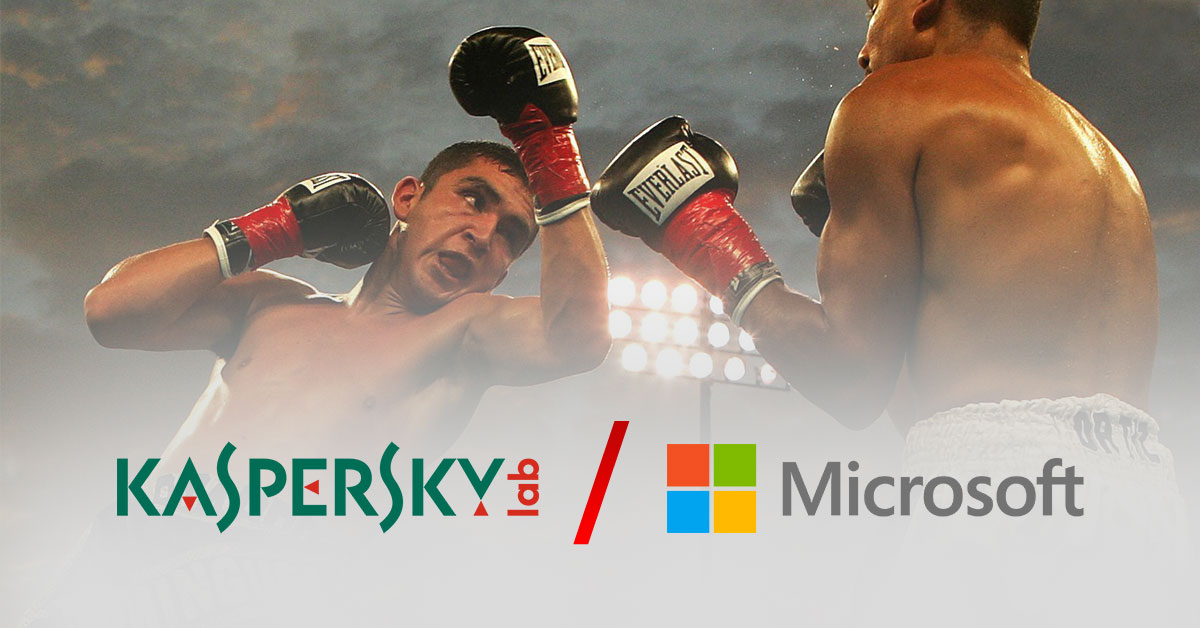Kaspersky Lab, the Russian cybersecurity and anti-virus vendor, filed a series of antitrust complaints against Microsoft earlier this month, stating the software giant is purposely disabling third-party anti-virus programs in favor of its Windows Defender AV. However, after delving further into the claims – and hearing from Microsoft themselves – it’s beginning to sound like Kaspersky Lab is just butthurt it could lose some of its market share.
There’s No Crying in Cybersecurity
Imagine you have one of the – if not the best product on the market. And imagine your product pairs directly with the most widely-used operating system in the world. Seems like a match made in heaven. Now, imagine that same operating system began developing their own product. One that was designed by their own engineers and that comes standard with their operating system at no extra cost to consumers. There’s no need to renew the subscription and no glaring need to install a third-party product. Not too shabby from the customer perspective.
Okay, so the new product isn’t as good overall as yours, but it’s not the worst either – and it keeps improving. So, just because you don’t like that there’s a new player coming up in the market, does that mean it’s illegal or infringing on anti-competition laws?
That’s the question begging to be answered as Kaspersky Lab recently filed antitrust complaints against Microsoft. Founder, Eugene Kaspersky said, “Microsoft uses its dominant position in the computer operating system (OS) market to fiercely promote its own – inferior – security software (Windows Defender) at the expense of users’ previously self-chosen security solution.” Isn’t the goal of every company, to promote and sell its own products?
But, we get it. In the age of hacking and cyberattacks, it makes sense to have the best possible anti-malware and anti-virus software available – or at least the option to use it. On one hand, Kaspersky was upset to find out that Windows 10 will sometimes disable third party software that is expired or not compatible with their latest updates and automatically turns on its own Microsoft Defender. Kaspersky Lab’s claims that Microsoft is allegedly trying to edge out competitors, but it’s their operating system. And if Microsoft now has the resources and R&D to develop an AV program that’s specifically designed and optimized for its own operating system, shouldn’t they be allowed to do so? Or at least be an available option for customers like Kaspersky?
Microsoft supports a community of over 80 independent software vendors through the Microsoft Virus Initiative (MVI) program – so, on the other hand Microsoft is working to ensure that its customers are never at risk for a cyberattack. “We built Windows Defender Anti-virus to make a promise to our customers that every Windows 10 device ALWAYS has protection from viruses and malware,” wrote Rob Lefferts, Partner Director at Microsoft, in a recent blog post addressing the publicity surrounding Windows 10. “If AV software is protecting our customers, Windows Defender Anti-virus will stay off. If a customer does allow an anti-virus application to expire, Windows Defender Anti-virus is automatically turned on so that they are not left unprotected.” Wipe away those tears Kaspersky, it seems pretty logical to us.
Then, what’s the issue?
That’s what we keep asking ourselves. Of course, the last thing any company wants is to have someone else encroach on their business, and Kaspersky Lab feels that, due to Microsoft’s size, it will be more difficult for specialized players like themselves to grab a share of the market if they push Microsoft Defender. Their issue arises when users update their system to Windows 10 and the Kaspersky software is temporarily disabled – but this doesn’t happen with every anti-virus program.
Lefferts wrote, “Microsoft’s application compatibility teams found that roughly 95% of Windows 10 PCs had an anti-virus application installed that was already compatible with Windows 10 Creators Update.” This means Kaspersky Lab is part of the 5% that didn’t meet the new compatibility standards. BUT WHY? According to Kaspersky, not enough time. He noted that problems could have been avoided if his team were given more time to confirm compatibility, “We’re only asking for a few more weeks to make necessary tweaks, which isn’t a lot to ask when customers’ security is on the line.” Fair point, but that doesn’t explain why other major AV players, like Avast and ESET, aren’t complaining about these same compatibility issues.
But it’s anticompetition right?
That’s yet to be determined. According to the FTC, ‘anticompetitive conduct violates Section 5 of the Federal Trade Commission Act, which bans “unfair methods of competition” and “unfair or deceptive acts or practices.”’ Kaspersky Lab is deeming it unfair that Microsoft is pushing its own AV application, while Microsoft is saying Microsoft Defender only runs when a third-party software is disabled or when a customer opts not to purchase or run an additional anti-virus or antimalware program.
Anticompetition is about pushing innovation. Kaspersky Lab has award-winning products, why wouldn’t Microsoft innovate to reach these standards? It’s also about keeping the market competitive – Microsoft is adding an improved product to the market to put forth yet another option for consumers to choose. The emphasis is on ‘choice’ as Microsoft is not forcing anyone to use Defender – rather the program is bundled into Windows 10 and gives people the opportunity to use it or upgrade their current alternative anti-virus software. And what about those who are unable to afford or choose not to use third-party programs – well, Microsoft now ensures they are also safe.
Kaspersky is no doubt a leading name in the anti-virus industry, but with only 5.22% of market share it’s hardly the biggest player. At face value, their claims could be true – that big bad Microsoft is purposely making it difficult for third-party AV providers to keep their customers and deceiving people about their intentions. FlexiSPY had a similar experience where we were accused of masking our software’s true identity and intention. However, in the end, the unfounded claims were seen for what they were – a desperate attempt to defame a brand they felt threatened by.
When did it become the responsibility of one company to slow down their own progress to make sure their competitors were doing okay? We understand it’s no fun holding a lower market rank than you think you deserve (we’ve all been there), but that doesn’t warrant trying to take down the very business that keeps your business afloat. That sounds a bit more like anticompetition if you ask us.
























Schreibe einen Kommentar